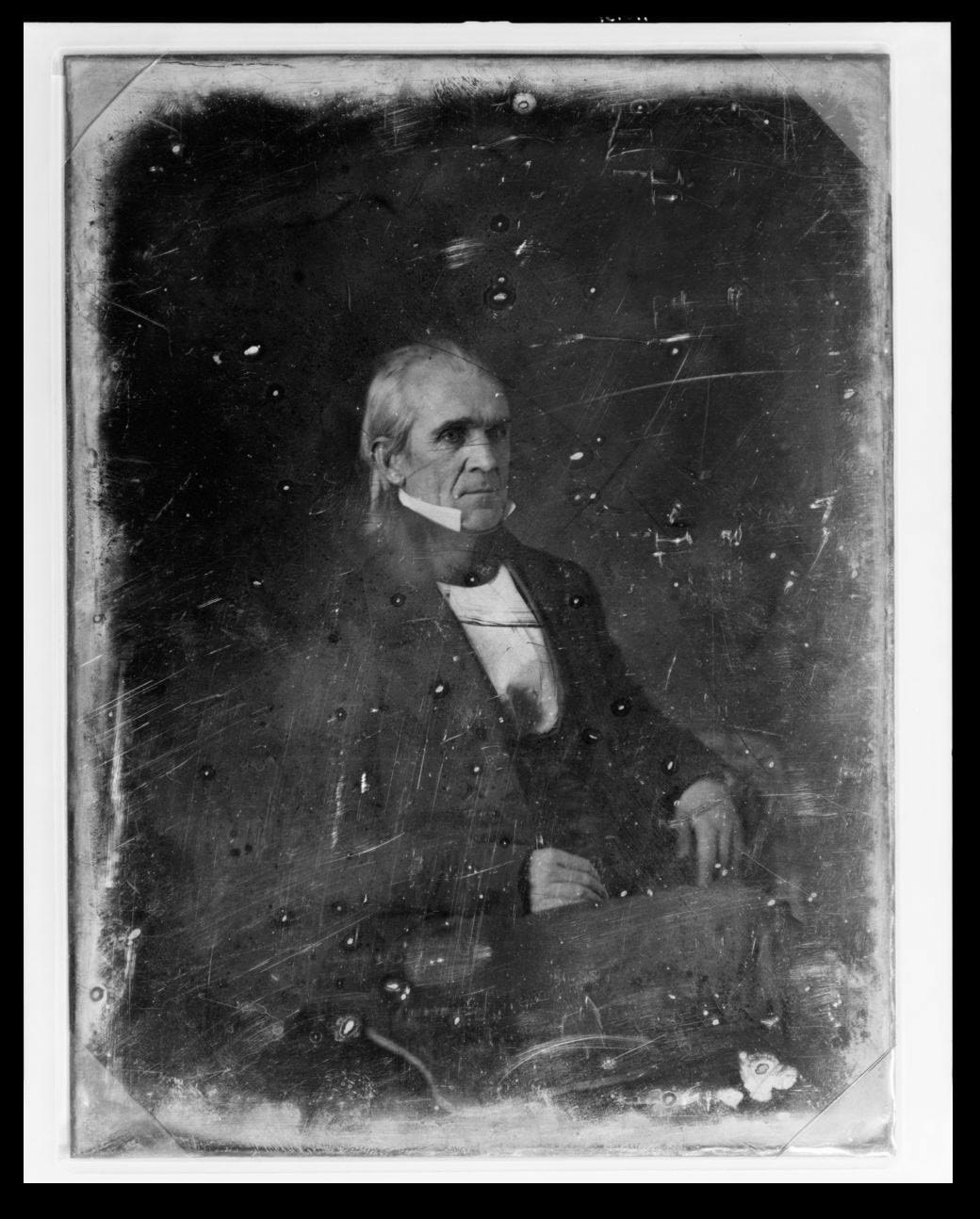In early June, I unleashed an article reaffirming Donald Trump’s many likenesses to Andrew Jackson, but also contrasting the window of time between the 2020 “corrupt election” and the ongoing campaign cycle leading us to 2024 with the period extending from 1824’s “corrupt bargain” to Jackson’s eventual triumph over entrenched corruption in 1828.
Some excerpts from that piece, which I dubbed “2024 is the new 1828”:
Trump felt a historic connection to Jackson as a president who railed against the political elites of his day and set out about forging a path to a new political future and rebirth of liberty.
-
Jackson, having won not only the popular vote, but the most electoral votes, expected the House to choose him as the winner and thereby confirm the choice of the electorate. However, the Kentuckian Clay, a shrewd political operator, or career politician, persuaded delegates of the three states he carried (Kentucky, Ohio, and Missouri) to throw their support behind Adams, while three delegations from Jackson-won states (Maryland, Illinois, and Louisiana) did the same.
John Quincy Adams was elected on the first ballot with the support of 13 state delegations, compared to 7 for Jackson, and 4 for Crawford. Jackson was stunned by the result, and upon learning of Clay’s inside dealings, referred to him as the “Judas of the West.” Does that sound familiar when it comes to electoral wheeling and dealing, and political betrayal?
-
Those two excerpts capture how Trump felt an historic connection to Jackson and found many traits belonging to “Old Hickory” worth emulating, and the perception of ongoing events, such as the perception of “corrupt bargains” being present in government during the one-term presidency of John Quincy Adams.
My father taught me to appreciate history and to understand that while it doesn’t generally repeat itself, it often rhymes. I wrote the Jacksonian piece to drive home the point that it would be foolish for Trump to moderatehis positions on election fraud in an ill-fated attempt to win over the mythical suburban, moderate, or independent voter demographics in a manipulated contest. It is scorched earth or bust.
I have not minced my words when expressing my thoughts on the insincerity of the DeSantis campaign, and his alignment with key Conservative, Inc., voices and influencers and Bush lackeys; however, as a military officer, I am inclined to assess the strengths of all camps without bias to compose a proper intelligence estimate. The Trump team must assess the strengths of primary opponents (there are few), and if they are doing their homework, they will look beyond DeSantis’s accomplishments as Florida governor and figure out how to counter one of their key points – Trump can only serve one term, while DeSantis can serve two.
It is true that the 22nd Amendment to the United States Constitution limits Donald Trump to just one more term in office. Should he prevail in 2024, he will quickly begin making way for a replacement in 2028. In most political cycles, I would consider this to be a substantial liability and deterrent to the electorate; however, in the spirit of both 1828 and 1844, the American electorate is looking for something different.
They are looking for an end to business as usual. People are sick of the political corruption, deliberate division, and profiteering off foreign entanglements. They are looking for a wrecking ball, not another status quo chief executive, and they have the memory of “no new wars” and a great economy seared into their memory as the Biden regime marches along dutifully.
Enter the memory of James K. Polk, the 11th President of the United States.
Polk, a Democrat from Tennessee, is one of our most underrated Presidents, and is considered the first “dark horse” President.
Dark Horse
“a candidate or competitor about whom little is known but who unexpectedly wins or succeeds.”
While much was known about Trump in 2015, few, including the betting houses, expected him to succeed in his quest for the Republican nomination, let alone the presidency. He was only a dark horse in the political sense. Two centuries ago, Jackson railed against the political elite and made major reforms in his two terms, but his movement eventually became part of the political establishment under the awful presidency of Martin Van Buren (1837-1841), and the Whig tandem of William Henry Harrison and John Tyler failed to impact major change from 1841-45.
Van Buren had been expected to be the Democrat nominee in 1844, but was upended by Polk, former U.S. Speaker of the House and two-year Tennessee governor, who promised to run for just one term. Washington had set a two-term precedent and declined what amounted to a kingship, but no one had ever promised to run for just one term. Polk certainly had some political maneuvering in mind in making this pledge, such as solidifying the support of the Democrat Party, but freed himself to do one thing:
Kick ass and take names without worrying about the impact on reelection.
Polk believed firmly in Manifest Destiny, the belief that the United States was to settle the North American continent and establish dominion throughout it. He set simple goals – to annex the Oregon Country, California, and Texas. Not everyone agreed with this plan.
It didn’t matter what the political class thought. It was full steam ahead.
Texas was annexed and became a state in 1845, and when Mexico didn’t like it, Polk commenced and won the Mexican-American War, which also gave America control of California in 1847, before hostilities ended. The Oregon Treaty was signed in 1846, settling a bitter dispute between the British and America.
True to his word, Polk left the presidency in 1849 and dropped dead (not a campaign pledge) in June of that year after giving way to Zachary Taylor, a hero of Polk’s signature war, who would drop dead the next year and be replaced by Millard Fillmore. Due to his many accomplishments done in just one self-imposed term, Polk is considered one of the most unsung champions of the American presidency.
Back in the present day, five-eighths of American voters understand President Trump should be putting a wrap on his presidency in the next 18 months, with two full terms of Making America Great Again; unfortunately, we live in a reality in which the existential crisis of our times is to resolve the manipulation of our elections. President Trump made no such pledge to serve only one term, but he will be limited to just that should he prevail over the mountainous corruption in just 16 months’ time.
Now is the time to channel not only Jackson, but James K. Polk.
For perhaps just this window of time is a single term exactly what the nation needs to satisfy the mounting demand for justice, reform, and the rebirth of a new political order.
Don’t like President Trump’s social media usage or decorum? No problem. Deal with it for 48 months and let him hand pick his successor, who will say and do mean things in a nicer tone.
We can step two more decades into the future from Polk and ask Trump to also channel Ulysses S. Grant, an imperfect man whose orders were to simply bring about victory at all costs (“he fights”), once he re-enters the Oval Office. America needs nothing more than a leader who isn’t holding back, moderating, mincing, or otherwise compromising his sincerely held beliefs and positions because he’s worried about reelection.
President Trump, like the rest of us, clearly thought that while certain counties or states are cheating in elections, the 2020 election would still be winnable. After all, he got in there somehow in 2016, taking out three states of the vaunted blue wall in the process after the Bush Republican wing had successfully squandered away the electoral votes of Virginia, Colorado, New Mexico, and Nevada, as well as other “swing states” Trump flipped after they had gone missing for two presidential cycles (Ohio, Iowa, and Florida). I firmly believe many of the decisions made in the Spring and Summer of 2020, during the height of the COVID hysteria, were made with reelection in mind, with no one possibly having the ability to know the extent of election manipulation possible, given that such a thing had never been detected in our national history.
The best Trump is the non-political Trump, like the one on the Republican debate stage in 2015 that dispensed of Jeb Bush, Marco Rubio, Chris Christie, Lindsey Graham, and many other establishment figures in a matter of months with brutal honesty, decisive action, and branding.
Don’t like this executive action to expose and clear up deliberate keeping of corrupt voter rolls and administration of fraudulent elections? Too bad. I have a pen and phone, too.
You think my border enforcement is bad? Next time don’t let 50,000 people cross over per month and we won’t require such drastic action and a wall with accompanying alligator moat.
I’m sorry we cancelled your global environmental pact. Our workers come first here in America.
I know better than anyone just how bad a special counsel can be. I wish you the best of luck in dealing with yours, especially with Arizona being so hot in the summertime.
You get my drift. President Trump can deflect one of the only meaningful opposition talking points by telling the electorate just how much of a benefit it is to them that the most non-political president in our history is limited to a single term. There will be no more business as usual, and nothing restricting the convictions of a second-term Trump if he chooses to live out his convictions.
"There is more selfishness and less principle among members of Congress...than I had any conception of, before I became President of the U.S."
James K. Polk





par usual, thought provoking, educational and spot on. Don't stop, people are waking up with articles like this. Kudos
One of your very best observations Seth! Thank you!!